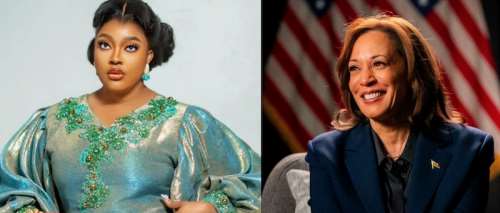Nollywood actress Biodun Okeowo has found herself at the center of controversy following her passionate defense of U.S. Vice President Kamala Harris’s presidential campaign.
The controversy erupted when Okeowo took to Instagram to share her thoughts on Harris’s electoral performance, praising the Democratic candidate’s efforts despite her defeat to Republican frontrunner Donald Trump, who secured over 267 electoral votes. The actress’s comments, while seemingly intended to celebrate female leadership, quickly drew criticism from her Nigerian followers who questioned the timing and focus of her support.
In her heartfelt Instagram post, Okeowo lauded Harris as a “superwoman,” emphasizing the Vice President’s “phenomenal strength, resilience, and drive” during her brief but intensive campaign period. The actress particularly highlighted Harris’s ability to mount a significant challenge in what she described as “just 100 days,” suggesting that while Americans might not be ready for a female president, Harris had demonstrated “unmatched strength” for the position.
In just 100 days, she campaigned relentlessly,” Okeowo wrote, adding a religious dimension to her commentary by noting that “Jesus is Lord” and emphasizing the importance of placing God above all else. She concluded her post with a diplomatic acknowledgment of the electoral outcome, stating, “Congratulations to whosoever God assigns as the US next president. God’s will above our choice.”
However, the actress’s comments sparked immediate backlash from her followers, who raised several pointed criticisms. Many questioned why she hadn’t shown similar support for local political figures, particularly referencing Funke Akindele, a fellow Nollywood actress who had previously faced her own electoral defeat. The criticism highlighted a broader debate about Nigerian celebrities’ tendency to comment on international politics while remaining relatively silent on domestic issues.
One particularly vocal critic, identified as Nora Big Wiz, directly challenged Okeowo’s selective advocacy: “When Funke lost, where was your post?” This sentiment was echoed by numerous other followers, who questioned the actress’s priorities and her focus on American politics over Nigerian affairs.
The controversy also sparked a broader discussion about the actual impact of Harris’s campaign, with some U.S. residents among Okeowo’s followers contesting the actress’s assessment. One such commenter, Chizzy Ify, provided a different perspective: “As a resident of the US, she did absolutely nothing that’s why we voted her out.”
Others pointed out historical context, with followers noting that previous female candidates, particularly Hillary Clinton, had come closer to securing the presidency. This observation challenged Okeowo’s characterization of Harris’s campaign as uniquely groundbreaking.
The incident has illuminated several interesting dynamics: the global reach of U.S. politics, the role of Nigerian celebrities in political discourse, and the sometimes complex relationship between entertainment figures and their social media audiences. It also highlights how international political events can trigger domestic discussions about representation, priority, and celebrity social responsibility.
The backlash against Okeowo’s comments reveals a growing expectation among Nigerian social media users for their public figures to engage more meaningfully with local issues rather than focusing on international politics. This sentiment reflects a broader trend of citizens calling for more sustained attention to domestic challenges and achievements.
As the discussion continues to evolve on social media, this incident serves as a reminder of the delicate balance public figures must maintain when commenting on international politics while being mindful of their local context and responsibilities. It also underscores the increasingly interconnected nature of global political discourse and the role of social media in shaping public debate about leadership, representation, and celebrity advocacy.
The controversy ultimately raises important questions about the responsibilities of public figures in shaping political discourse and the complex dynamics between celebrity advocacy and public expectations in an increasingly connected world.




